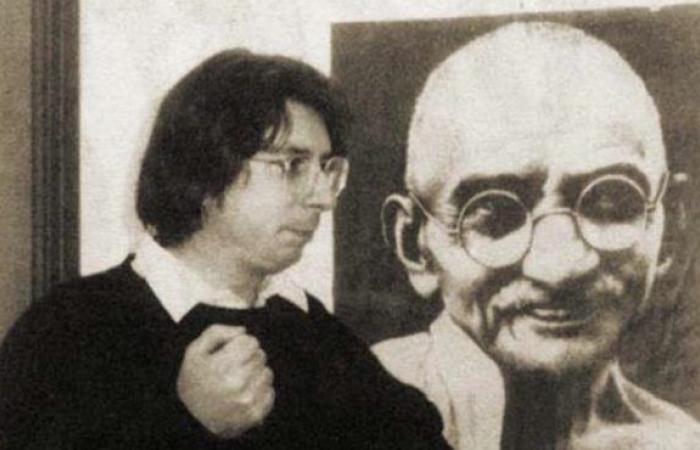Twenty-nine years have passed since Alexander Langer died on the evening of Monday, July 3, 1995.greeting the world from an apricot tree, perhaps because he was exhausted by a commitment that had lasted at least thirty years, perhaps because he was worn out by his progress against every banality and pattern, perhaps because he was too alone. A short life, he lived less than 50 years (49 to be exact), during which he nevertheless crossed the second half of the twentieth century in an original, free, courageous way. The prophetic substance of his writings and speeches is impressive. which is always worth returning to, to understand the black hole that his disappearance has left in Italian culture in general and, in particular, in a left that has gradually lost itself and the very reasons for history.
For this reason, the fact that on the very eve of this anniversary a book entitled “Alex’s view on peace” is being released, written by several hands (Luca Cirese, Massimo De Maio, Gian Carlo Fedeli, Giovanna Grenga, Pinuccia Montanari, Angelo Moretti, Marianella Sclavi and Simone Zoppellaro), is a great gift promoted and proposed by the European Movement for Nonviolent Action (Mean)an opportunity to return to some of his texts appropriately re-proposed in the book.
Some articles, written after his missions as a member of the European Parliament, are widely reported in the book, as well as his reflections on peace processes and ecological conversion, theimpasse of diplomacy in the face of the Chechen question and considerations on the decades-long failure of European diplomacy in the Caucasus and in relating to the conflicts born from the dissolution of the Soviet Union. His analyses remain current because he recognizes and denounces the plots of obstinate violence as well as of the obtuse politics that perpetuate and reproduce itself, while preventing any crossing of bridges or climbing over walls. Alex wrote in Personal minimum«On my bridge, traffic flows in both directions, and I’m happy to be able to contribute to the circulation of ideas and people».
His extraordinary intuition of the Civil Peace Corps, which Mean has relaunched in Italy and Europe in recent yearswas inspired to create the conditions so that the inhabitants of crisis areas, and those in danger of war, could become the protagonists of a process of social, economic, civil regeneration of their territory and of creative management of divergences.
As the authors explain on the eve of yet another important mission to Kyiv to promote the establishment of the European Civil Peace Corps: «It is an almost physical, epidermal urgency that pushes us – us as a small group without labels or roles – to return to read Langer on the eve of a trip to Kyiv. which for some of us is a return, for others the arrival of a path of concrete solidarity against the victims of the most frightening war (but not the only one) that is marking our Europe at the dawn of this millennium. To “fan” and “shouted” pacifism, Langer will write, “I prefer concrete pacifism, with concrete partners. I believe that we need more than simplistic options, good for pleasing the fans, but sterile compared to reality: a practice of peace, therefore, that feeds on concrete projects and good practices, rather than on sides and actions of pure testimony, and that therefore is capable of listening to those who experience those situations first hand and taking concrete action to help the victims of war, measuring themselves with damage reduction. And therefore, even just those who manage to put together a Serbian refugee with a Croatian or Bosnian refugee are already doing a great thing in my opinion”».
Angelo Moretti, who is the animator and spokesperson of Mean, underlines: «That search for “new pacifism” still emerges forcefully in the terrible Ukrainian scenario. A powerful invader, equipped with nuclear weapons, attacks a free and independent people within borders recognized by the international community. Not only that, the Russian Federation has the power of veto at the UN Security Council and despite the condemnations received, does not recognize any responsibility for the aggression, which with clear manipulative ostentation it calls a “special operation”, like an internal police operation. Marches, fasts, petitions, condemnation of armaments, what do they say in concrete terms to the Ukrainian resistance, to the civilian population that does not want to give up their land to the usurper of their existence? What do our appeals to the elderly, women and children who have seen the violence of Bucha, Irpini, Mariupo say? What do these new Europeans expect from pacifism today? Rereading Langer in Kyiv raises quite a few questions. The disarmament of the attacked is not the same as that of the aggressors. The fasting of pacifists does not satiate the hunger for justice of the oppressed.
In 1992, faced with the war in Bosnia, Langer wrote to explain the difference between fan-based pacifism, testimony and concrete pacifism.: “In the face of this situation, we feel that a pacifism, an action for peace, of mere testimony or vindication, is dramatically insufficient. (…) But the opposite position, which I would call “dogmatic pacifism”, seems equally simplistic to me. I was very surprised that some of the people who went to Sarajevo with the “blessed peace builders” last December returned from that extreme and singular experience, of great human significance, with the same a priori discourse that they had before, and with the same purely declamatory attitude on the universal value of peace and human rights. Unlike the very truthful and problematic testimonies of some participants (such as those of bishops Don Tonino Bello and Monsignor Bettazzi), other veterans from Sarajevo did not appear to be affected too much by the fact that the besieged Bosnians desperately ask for help against the besieging aggressors (and weapons to defend themselves if external help does not come). A bloody ethnic purge through massacres, rapes, deportations and devastation continues in a carpet-like fashion, the population, which is largely inter-ethnic, is forced to side with one side against the other, a deep chasm risks reopening between East and West, between Christians and Muslims, between Europeans to be defended and Europeans who can be slaughtered without any worries. All this cannot find as its only answer the abstract invocation of non-violence”.
Concrete pacifism
Hence his proposal for a “concrete pacifism”, that of coexistence between different people, that of mixed groups, as he wrote in November 1992, the decisive game is to build “attitudes for coexistence”. It is necessary, Alex writes: “a spiritual attitude and the ability to prevent must have to do not so much and not simply with the refusal of military action, but much more with the ability to build attitudes to coexistence. Look at the potential for hatred that can develop if – as has happened in recent days here in Europe – young people of eighteen, twenty, twenty-five years old decide to leave to set fire to an immigrant shack. It is a truly crucial issue, more than any problem of armaments; then it is very true that there are armaments, that there are those who produce them, those who have to sell them, to sell them they must be used, but the willingness today to use violence is the first point to identify in a work of peace”.
“Alex’s view on peace” also offers two writings that in my opinion are unmissable, the letter to Saint Christopher from 1990 and “About Jonah”, notes from a conference held at the invitation of the bishop of Bolzano in May 1995 in which one can feel Alex’s tiredness, the one that will lead him to leave the world from an apricot tree, leaving written: «The burdens have become unbearable for me… «Come to me, you who are weary and burdened» (Mt, 11,28)… Do not be sad, continue in what was right».
“This is a time in which not a day goes by without some stone being thrown at public commitment, especially political. There is too much corruption, falsehood, the triumph of appearance and vulgarity.. Too much credited are the false renewals, abusive moralisms, demagogy and simplism. Too evident is the charge of subversion and deviation that characterizes tasks that should have been of extreme responsibility. Too arrogant are reappearing social harshness, logic of the strongest, wild competition.
It is truly hard to know where to find the spiritual resources to test oneself on an increasingly impervious terrain. Wouldn’t it perhaps be wiser to abandon a field so poisoned that it cannot hope for any reclamation, and cultivate – if anything – elsewhere new plots, however modest they may be?
We must try to reread the short book of Jonah. How far away from the many self-appointed prophets! It is clear that Jonah is not running for any “nomination”, but rather tries to avoid it. We are hungry for truth, for prophets whose message is more important than the bearer: the person of the “prophet”, the interests of the “prophet”, the acquiescence to easy tastes and demagogy, often make it difficult to perceive the important and true messages.
There is an acute feeling of untruth in the face of messages shouted by the mass media, by political competition, by advertising, by conferences, by the very indignation of those who loudly proclaim their opposition and alternativeness. And one cannot give credence to reconstructions, theorems, ideologies that explain everything, frame everything, justify everything, make everything add up. There is a thirst for simple and true messages: verified, that is, by lived experience, not inflated or adjusted to better capture attention or curiosity».
We really need Alex’s gaze on peace, on politics, on love, on the concrete experience of coexistence between different people, of friendship. And this book makes it possible to meet his gaze and his words once again.






